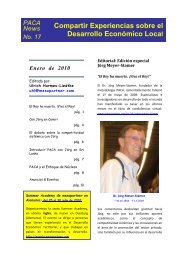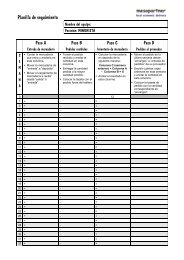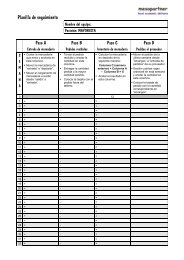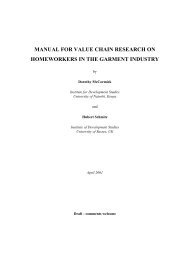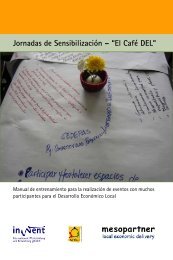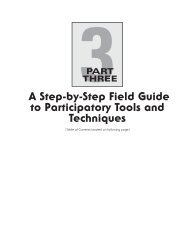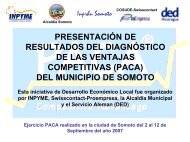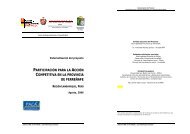OECD Culture and Local Development.pdf - PACA
OECD Culture and Local Development.pdf - PACA
OECD Culture and Local Development.pdf - PACA
Create successful ePaper yourself
Turn your PDF publications into a flip-book with our unique Google optimized e-Paper software.
1. USING A TERRITORY’S CULTURE TO PROMOTE LOCAL DEVELOPMENT<br />
surroundings into their own, friendlier version. This positive role of the arts can<br />
also be seen among people with mental illnesses. Painting <strong>and</strong> writing help some<br />
people to regain control over their own, internal lives, if only by giving vent to<br />
certain subjective aspects (Jensen, 1997). Similarly, theatre is often cited as an<br />
effective therapy for people with deficits in communication (Snow et al, 2003).<br />
- Another possible role of culture is in the correctional system, <strong>and</strong> particularly<br />
in crime prevention, as demonstrated by the programme supported by the Arts<br />
Council of Engl<strong>and</strong> (Art Council of Engl<strong>and</strong>, 2003). The useful studies are few,<br />
however, since only those that involve comparison between target <strong>and</strong> control<br />
groups can be meaningful. One study in California showed that prisoners who<br />
were exposed to arts programmes were less inclined to become repeat offenders:<br />
69% of those who participated in these programmes avoided further trouble with<br />
the law, compared to only 42% of those who did not take part (Clevel<strong>and</strong>, 2000).<br />
It seems that programmes that improve language, writing <strong>and</strong> self-expression<br />
skills are particularly effective.<br />
Can we measure the social effects of culture?<br />
If we are ready to admit, subject to the caveats expressed above, that culture plays<br />
a positive role in the organisation of social relations <strong>and</strong> the reintegration of excluded<br />
groups within a given territory, we still need to measure that impact. It is one thing<br />
to assert, as the European Commission has done, that culture “raises the level of people’s<br />
thinking, contributes positively to their social <strong>and</strong> psychological well-being, stimulates<br />
their awareness, <strong>and</strong> has a civilising impact”, but it is quite another thing to appreciate<br />
the scope of these effects (Council of Europe, 1997).<br />
This is a difficult undertaking, <strong>and</strong> there has been much debate as to whether it<br />
can be addressed through a general approach, or whether we must resort to case studies.<br />
The problems in conducting such studies are many: we must evaluate qualitative changes<br />
that often take long to materialise; the evaluations may have an important impact <strong>and</strong><br />
therefore must be underst<strong>and</strong>able to all stakeholders; the meaning of a nationwide<br />
study may not always be applicable to local conditions. Moriarty <strong>and</strong> Hill have both<br />
called for one-off studies at the local level, cast in language that will be underst<strong>and</strong>able<br />
for the people being studied (Moriarty <strong>and</strong> Hill, 2001). Such studies should also<br />
concentrate on tracking <strong>and</strong> monitoring rather than ex-post evaluation. The challenge<br />
here is not so much to come up with an accurate measurement of effects as it is to<br />
help cultural institutions improve their practices - hence the important distinction<br />
between formative evaluation (during the process) <strong>and</strong> final evaluation (after the<br />
process). Three methods are available to us.<br />
The first method is called the “multiple approach” (Matarasso, 1997). It starts by<br />
defining several themes: personal development, social cohesion, community<br />
46 CULTURE AND LOCAL DEVELOPMENT - ISBN 92-64-00990-6 - © <strong>OECD</strong> 2005



